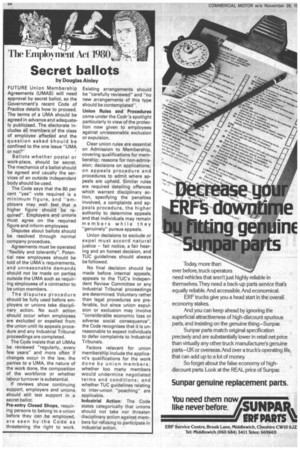The Employment Act 1980: 4 .
Page 66

If you've noticed an error in this article please click here to report it so we can fix it.
Secret ballots
by Douglas Ainley FUTURE Union Membership Agreements (UMAS) will need approval by secret ballot, so the Government's recent Code of Practice details how to proceed. The terms of a UMA should be agreed in advance and adequately publicised. The electorate includes all members of the class of employee affected and the question asked should be confined to the one issue "UMA or not?"
Ballots whether postal or work-place, should be secret. The mechanics of a ballot should be agreed and usually the services of an outside independent body should be used.
The Code says that the 80 per cent "yes" vote required is a minimum figure, and "employers may well feel that a higher figure should be required". Employers and unions must agree on the required figure and inform employees Disputes about ballots should be resolved through normal company procedues.
Agreements must be operated "flexibly and tolerantly". Potential new employees should be told of the UMA's requirements, and unreasonable demands should not be made on parties outside the UMA such as requiring employees of a contractor to be union members.
The disputes procedure should be fully used before employers or unions take disciplinary action. No such action should occur when employees are excluded or expelled from the union until its appeals procedure and any Industrial Tribunal proceedings are completed.
The Code insists that all UMAs be reviewed "regularly, every few years" and more often if changes occur in the law, the parties to a UMA, the nature of the work done, the composition of the workforce or whether labour turnover is substantial.
If reviews show continuing support, employers and unions, should still test support in a secret ballot.
Pre-entry Closed Shops, requiring persons to belong to a union before they can be employed, are seen by the Code as threatening the right to work.
Existing arrangements should be "carefully reviewed" and "no new arrangements of this type should be contemplated".
Union Rules and Procedures come under the Codc's spotlight particularly in view of the protection now given to employees against unreasonable exclusion or expulsion.
Clear union rules are essential on Admission to Membership, covering qualifications for mem bership; reasons for non-admis sion; decisions on applications; on appeals procedure and procedures to admit where ap peals are upheld. Similar rules are required detailing offences which warrant disciplinary ac tion, specifying the penalties involved, a complaints and ap peals procedure, the higher authority to determine appeals and that individuals may remain members while they "genuinely" pursue appeals.
Union decisions to exclude or expel must accord natural justice — fair notice, a fair hearing and an honest decision, and TUC guidelines should always be followed.
No final decision should be made before internal appeals, appeals to the TUC's Indepen dent Review Committee or any Industrial Tribunal proceedings are determined. Voluntary rather than legal procedures are preferable, but since union expul sion or exclusion may involve "considerable economic loss or adverse social consequence", the Code recognises that it is unreasonable to expect individuals to defer complaints to Industrial Tribunals.
Factors relavant for union membership include the applica nt's qualifications for the work done by union members; whether too many members would undermine negotiated terms and conditions; and whether TUC guidelines relating to inter-union "poaching" are applicable.
Industrial Action: The Code states categorically that unions should not take nor threaten disciplinary action against members for refusing to participate in industrial action.




































































































